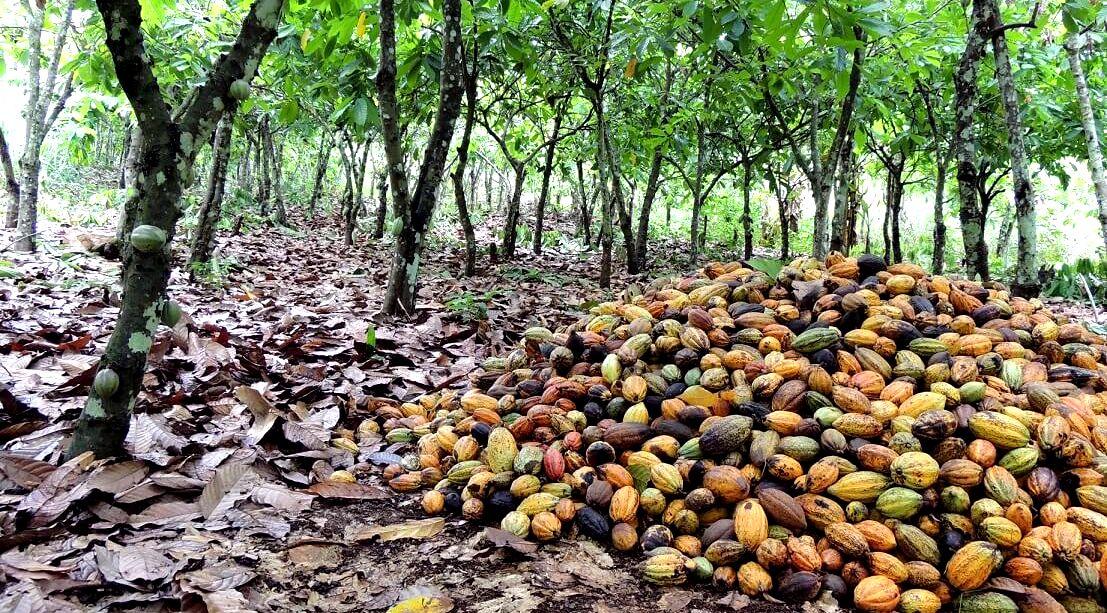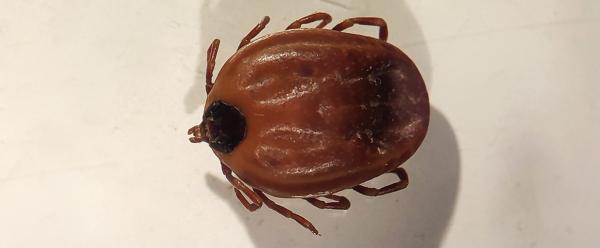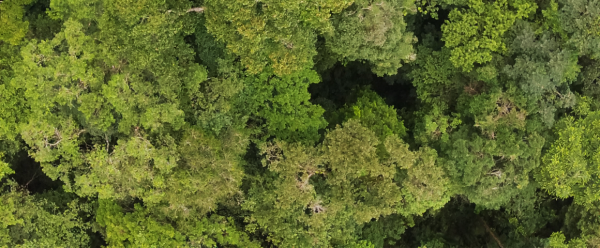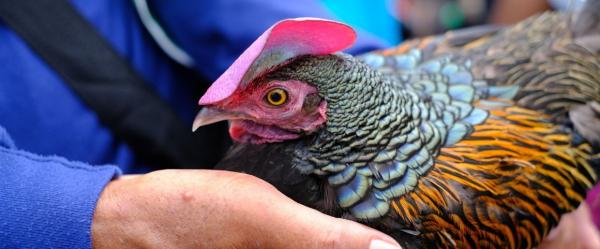Science at work 9 April 2024
- Home
- Press area
- Press releases
- cocoa growing agroforestry West Africa
Cocoa4Future: putting people and the environment back at the heart of cocoa growing

The harvest from an Ivorian cocoa planting © P. Jagoret, CIRAD
Ivory Coast and Ghana, the world's leading cocoa producers, are currently facing huge challenges, including climate change, an upsurge of certain diseases, and unstable global cocoa prices. To separate cocoa growing and deforestation, while helping to restore degraded cocoa plantings, the Ecole supérieure d’Agronomie at INP-HB, four Ivorian universities, a Ghanaian university and two NGOs* have joined forces with other partners to launch the Cocoa4Future project. Along with CIRAD, they have just signed a consortium agreement setting out the conditions for implementation of the project, which has been granted 6 million euros of funding from the European Union and 1 million from AFD.
Until 2025, the project partners will be assessing the agronomic, ecological and socioeconomic performance of the main cocoa growing systems in West Africa (monocropping, simple agroforestry and complex agroforestry). The resulting data will serve to identify and disseminate the technical and organizational innovations that will be most effective on a large scale, with a view to boosting the sustainability of cocoa growing in the region .
Has the current model run out of steam?
The historically dominant production model, based on monocropping after forest clearance using very cheap labour (often migrants) is now beginning to falter. In addition to committing to protect the last remaining forests from clearance, Ivory Coast and Ghana have now run up against the ageing of their cocoa plantations and the increasing scarcity of available forest zones. The challenge of rehabilitating former plantings is exacerbated by the presence of Cocoa Swollen-Shoot Virus (CSSV) and global climate change, which is resulting in substantial fluctuations in cocoa yields, hence in producers' incomes and exacerbating the effects of CSSV, and which will eventually limit the areas suitable for cocoa growing.
Assessing the resilience of cocoa farms
In the light of this uncertain context, "Cocoa4future aims to identify the most efficient cocoa systems and to work hand-in-hand with cocoa growers and other stakeholders in the value chain to invent sustainable technical, economic and organizational models that will guarantee a decent living for producers", Patrick Jagoret, the CIRAD agronomist who is coordinating the project, explains.
To this end, Cocoa4Future, which involves more than ten CIRAD researchers, will be addressing economic, ecological and agronomic issues in its operations. This multi-criteria assessment is intended to pinpoint the most efficient cropping systems and those that are most resilient to global change. For the latter criterion, three types of system will be studied: monocropping, simple agroforestry and complex agroforestry.
"Around fifteen sites, split between Ivory Coast and Ghana, will be studied closely", Patrick Jagoret adds. "In all, 150 plots will be checked regularly as regards the ecosystem services provided, yields, and resilience to climate change or diseases."
In particular, the spotlight will be on Cocoa Swollen Shoot Virus (CCSV), which is transmitted by scale insects and is a real scourge for cocoa trees. Control methods, using planted barriers, are being tested in the hope of slowing the entry of vector insects into plots. The investigations will continue with Cocoa4Future, which is hoping to identify the species of scale insect involved and improve our knowledge of the disease.
Work in collaboration with a large number of farms
Many farmers in both Ivory Coast and Ghana split their time between growing cocoa and other activities such as fish farming or rice growing. However, the chemical inputs used in cocoa growing can affect surface water quality and consequently fish growth. This issue will be studied in partnership with APDRA. Researchers will also be studying changes in practices and strategies among cocoa growers. Some 400 farms in Ivory Coast are to be monitored by the University of Daloa and CIRAD, and 150 in Ghana by the University of Ghana.
Cocoa quality is another element of the project: the impact of agroforestry on cocoa organoleptic properties (taste, flavour, odour, etc), the identification of terroirs, or the promotion of agroforestry practices. A team will also be studying how producer incomes can be boosted by promoting these ecological practices .
"Agroforestry is the key topic for Cocoa4Future , particularly in the light of the current acceleration in deforestation in these regions", says Patrick Jagoret. "Agroforestry systems help to improve soil quality and regulate pest populations, among other things. In a word, they restore some of the ecosystem services usually rendered by forests."
The researchers working on Cocoa4future hope, by the end of the project, to be in a position to offer sustainable cocoa systems that meet farmers' expectations. "We aren't looking to develop a standard cropping system that everyone will have to use", Patrick Jagoret points out. "The project aims to put people and the environment back at the heart of cocoa growing. It will be up to producers, the main beneficiaries of the project, to make their own decisions, based on the information we will have given them in terms of the economic and environmental benefits."
Farm advisory services, whether provided by NGOs, private firms or ANADER, will be fuelled by the results obtained. The innovations developed by farmers and researchers will be rolled out across West Africa.
DeSIRA, a European programme to support the agricultural transition to resilient, sustainable production methods
The DeSIRA initiative (Development Smart Innovation through Research in Agriculture) is an EU programme led by the European Commission Directorate General International Partnerships (DG INTPAR). It is devoted to agricultural research in the global South in relation to climate change.
In the light of the acceleration in climate change, the DeSIRA initiative intends to pinpoint innovations that will transform the agricultural sector and pave the way for resilient, sustainable agrifood systems. To this end, DeSIRA is funding numerous research projects in collaboration with partner countries in the global South, primarily targeting crop and livestock farmers, along with producer organizations, NGOs, processors, consumers, etc.
Following the initial call for proposals, CIRAD was associated with ten projects, and it is now coordinating thirteen, alongside around ten European scientific partners, several CGIAR centres and some twenty partners in the global South
The cocoa boom in West AfricaIn 50 years, cocoa production in Africa has gone from 865 000 to 3 million tonnes. Those figures confirm the continent's dominant position on the cocoa market, particularly Ivory Coast and Ghana, which together account for 70% of global cocoa supply and employ almost two 2 million smallholders. Chocolate product consumption is expected to rise significantly in the next few years, thanks to improved living standards in several densely populated emerging countries. It is therefore crucial for Ivory Coast and Ghana to boost production while respecting the environment. |
*Partners
- Five Ivorian research institutions: Félix Houphouët-Boigny University (Centre ivoirien de recherches économiques et sociales, WASCAL and UFR Biosciences), Ecole supérieure d’agronomie/ Institut national polytechnique Houphouët-Boigny (forestry, and management, trade and applied economics departments), Jean Lorougnon Guede Daloa University (interdisciplinary research group on landscape ecology and environment), Nangui Abrogoua University (ecology and sustainable development and food biotechnology and microbiology laboratories), and the Centre national de recherche agronomique;
- Two Ghanaian research institutions: Cocoa Research Institute of Ghana, University of Ghana (School of Agriculture and Institute of Statistical, Social and Economic Research);
- Two NGOs: APDRA (fish farming) and NITIDAE (value chain building and organic cocoa);
- The European Commission Joint Research Centre.


























